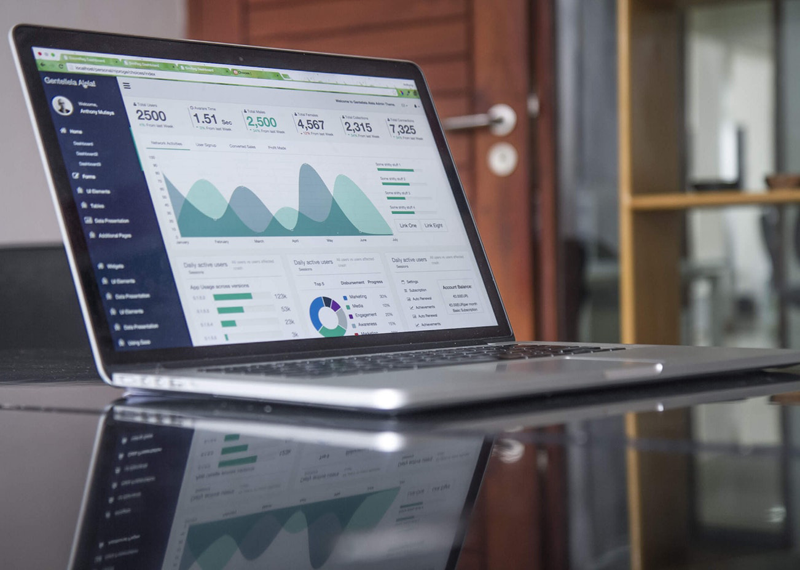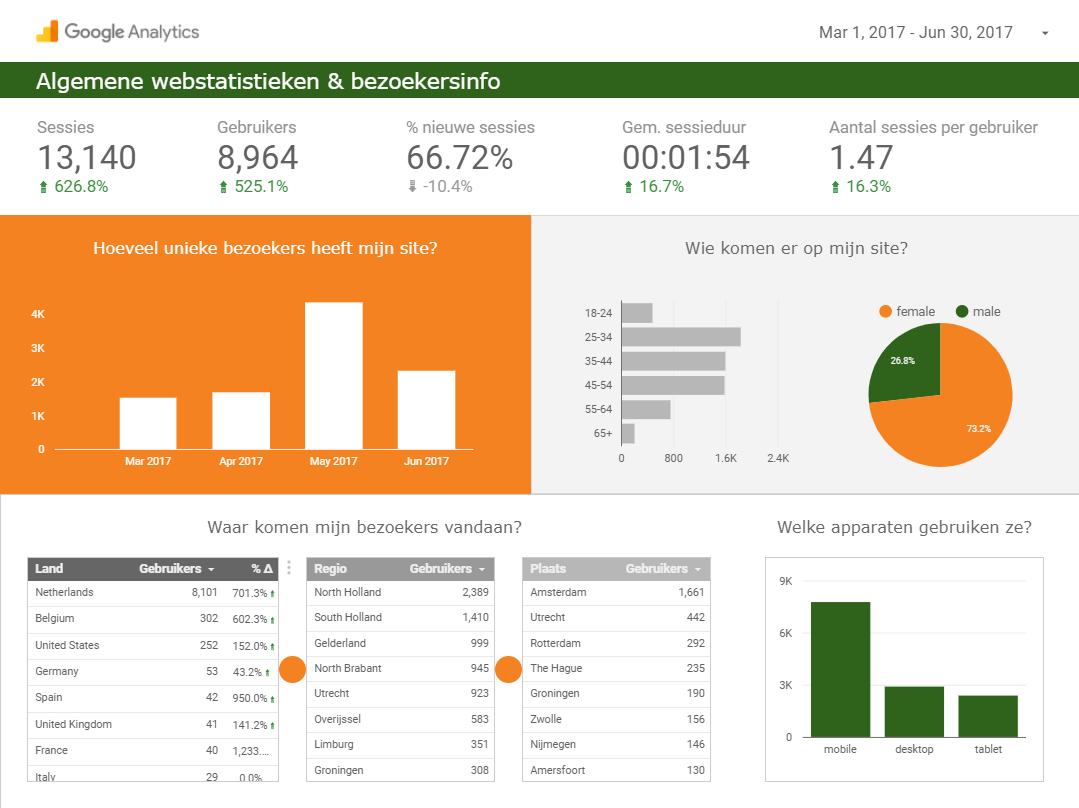What is data analytics?
Understanding data analytics
- Article
- Data Analytics

Every company collects data. But what exactly is data analytics? Why do companies collect data? Why are they investing in data analytics? And what can you do with it yourself? Let us explain.
What is data?
Since the internet has existed and almost every company has a website, a distinction has been made between offline and online data.
Examples of offline data that is collected by companies include:
- Invoice data of customers, maintained in an Excel file.
- The number of business kilometres that the employees have driven.
- The time that an average visitor has spent in a museum, recorded through entrance gates.
- The average order value of a clothing store, registered by the cash register system.
Offline data is therefore all data collected without using the internet.
Examples of online data that is collected by companies include:
- The number of clicks on an ad on Facebook or Google.
- The number of times a visitor has visited the same website.
- The percentage of unique users who have made a purchase on a website.
- The extent to which each specific marketing channel contributed to a sales transaction.
By linking online data sources with offline data sources, you can gain insight into the customer journey. A customer always comes into contact with your company or brand through multiple contact points. Think of store visits, (online) advertisements, word of mouth and social media. Every touchpoint impacts the customer experience. The better all channels work together, the better the customer experience.

Why do companies collect data?
Many processes in organisations cannot take place without data. For example, do you want to sell a product or service? Then you must save the transaction data to show the tax authorities that they have taken place.
Collecting data to see how you are performing
Every organisation has a strategy, mission and vision. After all, if not, you have no right to exist. But how do you know if you are on the right track? Data plays an important role in monitoring your progress towards your goals. You can make your goals measurable and monitor them using Key Performance Indicators. For example, do you have a webshop and do you want to achieve a specific turnover this year? Then you steer towards average order value, among other things. You continuously monitor this and try to increase it by setting up your website accordingly.
Collecting data to better understand your target audience
Companies collect data, among other things, to better serve their customers. With the help of data analytics it is possible to map the customer journey. For example, you can see through which marketing channels (email, advertisements, partner websites, etc.) visitors come to your website. But also whether they prefer to use a mobile or tablet and how they then navigate through your website.
These preferences and behavioural patterns, of course, vary from person to person. Yet it is often possible to segment your target group. You then compose 'buyer personas' that are representative for a type of person. Take, for example, 'Jan, a highly educated man in his fifties with a responsible job, little time and a great need for quality'. You work out this buyer persona in details such as: 'where he does his shopping, what his hobbies are and what type of car he drives'. This allows you to better empathise with your target group(s) and respond to them.
Buyer persona Jan has different needs and preferences than a student or family, and therefore goes through a different customer journey. A Customer Experience Specialist helps you map this and respond to it. This way you strengthen the relationship with your target group and customers, ensuring higher satisfaction.
Collecting data to use as input for decisions
- Are you getting started with your marketing plan? Then you want to spend your budget on marketing campaigns that pay off. For this you need insight into the results of all the actions you have taken so far.
- Do you want to make your website more user-friendly? Then you first need to know how your visitors experience the ease of use and how they react when you change something.
- Do you want to spread the traffic of a tourist attraction more efficiently? Then you need insight into the peak times so that you can, for example, offer cheaper tickets for quieter times.
- Do you want to generate more turnover? Then you need to know what each product and channel delivers and how you can improve this.
- Do you want to buy new stock? Then it is very valuable to know how many products you have sold in the past period.
Collecting data to anticipate the future
If you buy new stock, you would prefer to know what you are likely to sell in the near future. Or you want to know in which business assets you can best invest for the highest return. Today, more and more predictions are made based on data for these kinds of purposes. Self-learning algorithms can provide insight into future opportunities, sales patterns and other developments based on large amounts of big data. Such algorithms are written by Data Scientists. Read more about the definition and added value of Data Science here.

How do companies collect data?
Data is often collected by Data Analysts and Technical Web Analysts using different programs and systems. Most companies use a server with all kinds of documents and a CRM or ERP system to store their customer data, appointments and sales data. In addition, there are all kinds of tools with which you can collect online data. For example:
- Intranet environments to provide employees with information.
- Web analysis tools to measure website visits.
- Email tools to keep interested parties informed.
- Web tagging tools to measure visitor behaviour on the website.
- A/B testing tools to conduct online experiments.
- Advertising pixels from platforms such as Facebook and Google.
For example, there are several offline and online data sources at every organisation. Some organisations link as many as possible to each other. This creates one large database with all the data that is collected: 'one single source of truth'. The good thing about this is that all employees within the organisation make their decisions based on the same information.
What is data analytics?
All useful data that companies collect is analysed by Data Analysts. They use data analysis tools to analyse the data. They visualise that data using data visualisation tools. They usually provide reports in the form of clear dashboards. A dashboard consists of several clear graphs and tables with data. They are compiled based on the questions of those involved within the organisation.

From data to doing
Using data analysis and dashboarding, Data Analysts gain insights that can help achieve business goals. Which insights these are, strongly depends on the mission, vision and strategy of the company.
Do you want to learn how to proceed? Request or attend a training or inspirational session or have a go yourself on translating your mission, vision and strategy into Key Performance Indicators (KPIs).This helps you measure what you want to know and actually use your data as the basis for effective actions that contribute to your goals!
Need advice on Data Analytics?
If you want to reap the benefits of data, you have to start with the basics. What are your mission, vision and strategy? What objectives do you want to achieve? Based on that, you can decide which data to collect and analyse.
Our Data Analytics Consultants are happy to share ideas on how your organisation can benefit from data-driven working. Read more here or contact us directly.
This is an article by Marloes de Bruin, Marketing Manager at Digital Power
Marloes de Bruin is Marketing Manager at Digital Power. She is a strategic, all-round marketer, passionate about data-driven marketing. She writes on a variety of topics using input from our data consultants.
Marketing Managermarloes.debruin@digital-power.com
Receive data insights, use cases and behind-the-scenes peeks once a month?
Sign up for our email list and stay 'up to data':